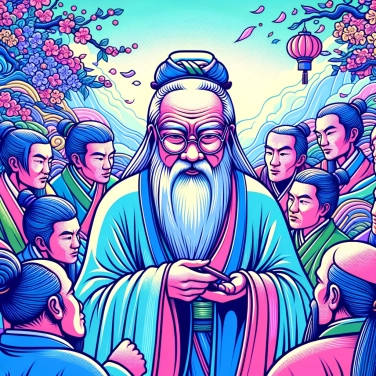Confucius was revered as a philosopher in China due to his teachings focused on morality, ethics, and good governance, which constituted the fundamental principles of Chinese society for centuries.

Confucius places at the heart of his teachings the principle of ren, which could be simply translated as "benevolence" or "humanity." Essentially, it is the idea that one should treat others with respect and empathy, just as one would like to be treated oneself. He also emphasizes li, the notion of respecting rites and appropriate behavior in society. For him, following proper conduct and being capable of respect and benevolence are what create harmony in society. He adds to all this the idea of filial piety, meaning sincere respect for one's parents, ancestors, and elders. In short, for Confucius, everything starts with oneself: by cultivating oneself morally, by respecting social and family traditions, everyone directly contributes to making their environment more virtuous and harmonious.
The ideas of Confucius have largely influenced the way China has organized its government and society for centuries. His concept of social hierarchy structured around familial relationships and strict respect for superiors imposed a deep sense of discipline and order. Imperial officials, for example, were often selected through examinations based on Confucian teachings, which emphasized integrity, moral competence, and the common good rather than mere social status or connections. Generally speaking, Confucianism has greatly contributed to the development of a society where everyone knew their place and duties, and where respectful behavior was valued. Even today, in modern China, some principles laid out by Confucius still clearly influence family and professional relationships, as well as citizens' expectations of the state and the country's leaders.
Confucianism was a major pillar in traditional Chinese education, with a clear obsession for learning and self-improvement. During the imperial era, Chinese society relied on imperial examinations, which were primarily based on Confucian classics. There was no way to escape the master's texts if one wanted to secure an official position! Confucius greatly valued education as a means to cultivate virtuous individuals capable of positively contributing to the community. With that, he shaped Chinese cultural values: respect for elders, a sense of familial duty, and politeness in all social interactions. His influence extended to the arts, literature, and Chinese cultural traditions; one could say that in China, Confucius is truly everywhere!
Confucius remains an immense historical figure in China even today — so well-known that even those who have never read his writings recognize his name. For about 2500 years, his words have been quoted by the Chinese in all contexts as ultimate examples of wisdom. People love to refer to him as the perfect example of a sage, one who understands life and knows exactly how to behave properly. He quickly became a symbol that far exceeds the actual history of the character: statues, paintings, and proverbs bearing his name are found everywhere in the Chinese cultural imagination. He is often depicted with a long white beard, a sign of wisdom and respectability. In short, Confucius has evolved from a mere thinker to a true cultural emblem immortalized through the generations.
In China, Confucius is celebrated through ceremonies and temples specially dedicated to his memory, called Confucian temples. People come to pay their respects with offerings, incense, and well-established rituals. Every year, the anniversary of his birth is marked by grand official ceremonies, featuring singing, traditional dances, and honorific speeches. These ceremonies emphasize the respect for the values taught by Confucius, such as filial piety, personal morality, and wisdom. Many students also come to seek his blessing for their exams, as Confucius is regarded as a natural patron of studies and education. Today, even though the celebrations have become less strict, they remain rooted in Chinese popular culture.
The famous work 'The Analects' (Lunyu), which compiles the dialogues of Confucius, was not actually written by him, but by his disciples years after his death.
Although Confucianism is perceived today as a philosophy, at various times in Chinese history, it was also granted an almost religious status, accompanied by rites, ceremonies, and temples dedicated to Confucius.
Confucius strongly advocated the practice of 'Ren', a Chinese concept meaning 'benevolence' or 'humanity', which encourages each person to treat others with the same respect they would wish for themselves.
For more than 1,300 years in imperial China, mastery of Confucian texts was mandatory during the imperial examinations for candidates aspiring to become officials, thereby ensuring the prominence of Confucianism within the Chinese government.
Confucius placed education at the heart of moral and social development. He believed that every individual could attain virtue through study and self-improvement. His teaching methods emphasized reflection, continuous learning, and the transmission of values through example.
The ideas of Confucius have profoundly influenced governance in China: his ideal of a government based on ethical, honest, and responsible leaders has led to administrative practices emphasizing competence, integrity, and the moral education of officials.
Yes, traditional ceremonies honoring Confucius still exist today in China, particularly during Teacher's Day and on anniversaries commemorating his birth. Several Confucius temples hold these ceremonies to recognize his contribution to Chinese education and culture.
Confucius remains essential in Chinese culture due to the universality and enduring nature of his ethical principles, their foundational role in the social and political structuring of China, and the symbolic status he embodies as a timeless model of wisdom and moral virtue.
Confucius primarily taught moral virtue (Ren), the respect for rituals (Li), the importance of family and social harmony, as well as education as an essential tool for a just and orderly society.

No one has answered this quiz yet, be the first!' :-)
Question 1/5